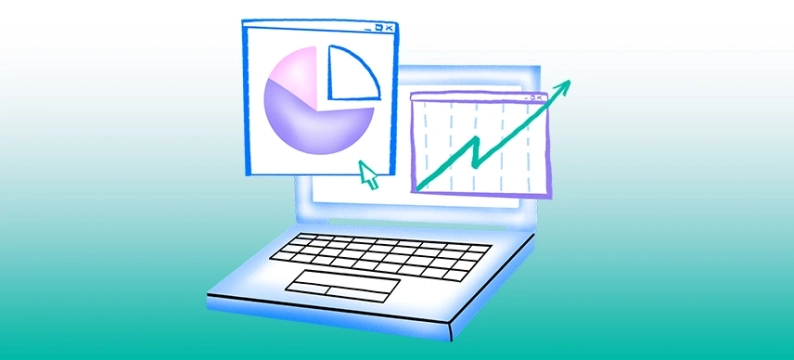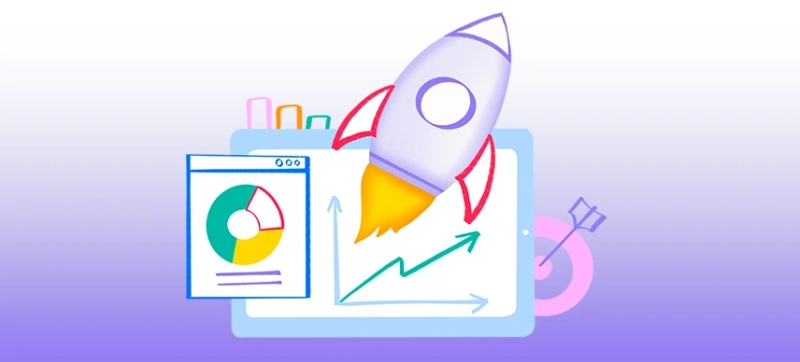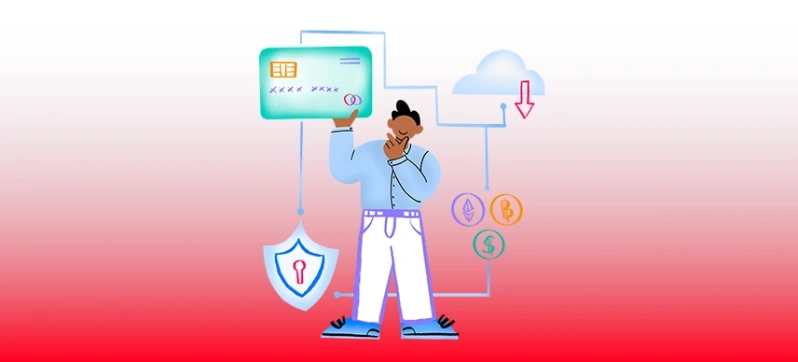
In today’s competitive business world, it is vital for businesses to speed up their operations, increase efficiency and minimize errors. B2B order management plays a critical role, especially for businesses with large volumes and complex transactions. At this point, ERP (Enterprise Resource Planning) software integrates processes and ensures that orders are processed accurately and quickly. Thanks to ERP software, many processes such as stock control, invoicing, shipping and customer relations can be managed together.
In the article you are reading, we will explore how B2B order management can be carried out effectively using ERP software, how processes can be improved, and the strategic advantages these systems provide to businesses.
What is ERP Software?
ERP (Enterprise Resource Planning) software is a technological solution that integrates different business processes of businesses such as finance, production, supply chain, human resources and sales on a single platform. The mentioned systems allow all operations to be collected in a single database and different units to work synchronously on this data. The main purpose of ERP software is to make business processes more transparent and efficient.
For example, a business's stock status, sales figures, and cost analysis can be tracked instantly through a single system. This speeds up decision-making processes and reduces error rates. When it comes to B2B order management, ERP software enables automatic processing of orders, harmonization with suppliers, and timely shipment.
Order management done with traditional methods can cause manual errors, loss of time and communication gaps. ERP software eliminates these problems and offers businesses a competitive advantage. The system allows businesses to make faster and more accurate decisions thanks to real-time data access. Especially for large-scale businesses, ERP software enables the digitalization of operations and the strengthening of automation processes.
The features described above play an active role in complex processes such as B2B order management and increase customer satisfaction. ERP software is an indispensable tool for businesses that want to both reduce costs and speed up processes.
What is B2B Order System?

B2B order systems are structures that manage the bulk product or service purchasing and selling processes between businesses. They aim to regulate the supply chain processes of companies while also increasing the accuracy and delivery speed of orders. Compared to traditional methods, digital B2B order systems automate the order management process, allowing for more efficient and organized transactions.
B2B order management is a critical process that ensures orders are delivered with the right product, the right quantity, and on time. Its functions can be explained in detail as follows:
- Ensure Order Accuracy: Minimizes human error with digital tools. Makes it easier for customers to choose the right products and services.
- Automatic Process Management: The system automates the entire process from order taking to invoicing, reducing operational load.
- Real-Time Tracking: Suppliers and customers can track the status of orders in real time. This improves delivery time management and customer satisfaction.
- Integration with Stock Management: Unnecessary stock load is avoided by ensuring that orders are created according to stock status.
- Supplier and Customer Communication: Combines all communication and collaboration processes on a central platform, so that the flow of information becomes seamless.
B2B order systems have become an indispensable part of businesses in the digitalizing business world. They offer an ideal solution for managing high-volume orders accurately and on time. With the help of digital tools, they provide businesses with speed and efficiency, while also increasing customer satisfaction and reducing costs. The transition from traditional methods to digital B2B order systems is the key to sustainable growth for businesses.
Relationship Between ERP and B2B Order System
ERP (Enterprise Resource Planning) software and B2B order system are two important components that aim to optimize order management by integrating all processes of businesses. While ERP software combines the flow of information between different departments of businesses in a single system, the B2B order system is at the center of this process. This relationship ensures that the order process is kept under control from beginning to end and increases operational efficiency. Here are the details of how ERP strengthens B2B order management processes:
1. Automatic Processing of Orders
When ERP software is integrated into the B2B order system, there is no need to process orders manually. For example, an order placed by a customer is automatically processed in a system integrated with ERP, stock status is checked and the invoicing process is initiated. This automation speeds up the process while reducing the error rate.
2. Real-Time Stock and Inventory Management
An ERP system provides real-time inventory management to the B2B ordering system. For example, the ERP software sends signals to the supply chain when a product is out of stock and automatically initiates the replenishment process. It ensures complete customer service and prevents order cancellations.
3. Optimizing Sales and Distribution Processes
A B2B ordering system integrated with ERP tracks the order step by step from receipt to delivery. When a distribution company organizes shipping plans through ERP, the system optimizes delivery timing, saving both time and money.
4. Simplifying Financial Processes
ERP software also automates the invoice creation, payment tracking, and accounting processes related to orders. For example, a business can check the payment for orders received through ERP and send automatic notifications to customers for delayed payments.
5. Integration with Customer Relationship Management (CRM)
ERP software works in integration with customer relationship management (CRM) systems. This integration increases customer satisfaction by recording customers' order history, preferences, and special requests. For example, an ERP system can identify products that a customer frequently orders and offer special offers for these products.
A Sample Scenario
Consider a wholesale food distributor. This business combines ERP software and a B2B ordering system to provide a seamless ordering experience for its suppliers and customers. When customers order through an online portal:
- ERP software controls the stock level.
- Automatically sends a stock replenishment request to the supplier.
- Shipment planning is done and the order status is notified to the customer.
- Every step in this process can be monitored in real time and is supported by ERP.
Integration of ERP software with B2B order system enables businesses to work faster, more efficiently and accurately. Advantages such as real-time data tracking, automation and interdepartmental collaboration increase the quality of the B2B order management process.
The relationship not only reduces operational burden but also maximizes customer satisfaction. Therefore, the relationship between ERP and B2B ordering system is indispensable for modern businesses to gain competitive advantage.
How to Implement ERP Integration?

Successfully integrating ERP software is a critical process for optimizing a business’s B2B order management. It involves aligning the ERP software with the business’s existing systems and bringing all business processes under one roof. Below, we will examine the details of this process and the points to consider.
Step by Step Integration Process
ERP integration requires careful management in the planning and implementation stages. Here is the step by step process.
Determining Needs:
- Determine in which processes your business needs ERP.
- Analyze B2B order management processes in detail and determine which points will be facilitated by integration.
Choosing the Right Software:
- Choose an ERP solution that fits your business needs.
- Consider flexibility, scalability, and customization options.
Data Integration:
- Prepare data to be migrated to ERP by analyzing existing databases.
- Conduct tests to reduce the margin of error during data transfer.
Testing and Implementation:
Conduct a small-scale testing phase before deploying the ERP system.
After the testing process, ensure that the system is implemented in all business processes.
Technical Requirements and Preparation:
Technical preparations for ERP integration are vital for the system to work smoothly. Here are the technical requirements to consider during this process:
Infrastructure Preparation:
- The servers and systems on which the ERP will run must be sufficient in terms of performance and security.
- A choice must be made between cloud-based or local solutions.
Data Security:
- Compliance with data security standards must be ensured during all data transfers.
- Secure backup solutions should be created.
System Integration:
- ERP must be compatible with the company's existing CRM, accounting and B2B order management systems.
- Connections between systems can be established using Application Programming Interfaces (APIs).
Continuous Monitoring of Integration:
After the ERP integration process is completed, the system needs to be monitored and optimized regularly. At this stage:
- System performance should be monitored in real time and potential problems should be detected early.
- B2B order management can be made more effective by increasing the efficiency and speed of order processes.
- Feedback from employees using the ERP system should be collected.
- Improvements should be made to the system based on user experience.
Updates and Maintenance:
- Regular updates of ERP software should be ensured.
- Security patches and new features must be quickly integrated into the business.
ERP integration modernizes the current processes of the business and creates a faster and more efficient working environment. Determining the needs, preparing the technical infrastructure and continuously monitoring the process are the keys to successful integration. Especially in complex processes such as B2B order management, errors are minimized and operational load is lightened thanks to ERP integration. With proper planning and monitoring, the ERP system becomes a critical tool in achieving your business's growth goals.
Common Problems in the B2B Order Process

B2B order management is a critical process for businesses to achieve success in their supply chain and customer relationships. However, various problems can arise during this process and negatively affect the operational efficiency of businesses. Here are three basic problems that are frequently encountered in B2B order processes:
Incorrect Stock Information
Proper inventory management is the cornerstone of the B2B ordering process. However, when inventory information is not updated correctly, the following problems can occur:
- Providing incorrect information to customers when ordered products are out of stock will lead to customer dissatisfaction.
- Businesses may face unnecessary costs due to excess inventory.
These types of errors are common when integrated solutions such as ERP software are not used. Real-time inventory tracking in B2B order management processes is vital to avoid this problem.
Delays and Wrong Shipments
In B2B order systems, logistics and shipping play a key role in successfully completing the process. However, the following issues can commonly occur:
- Failure to ship orders on time damages relationships with customers.
- Shipping the wrong products will prolong the return process and cause loss of time and cost.
The mentioned problems usually arise from manual tracking systems. Thanks to automation and ERP integration, shipping processes can be easily optimized.
Payment and Invoice Disputes
Payment and invoicing is another area that needs attention in B2B order processes. The following problems are frequently encountered:
- Incorrectly calculating the order amount or sending the wrong invoice to the customer may cause loss of trust.
- Late payments can negatively impact a business's cash flow.
Automatic invoicing and payment tracking modules in ERP software greatly reduce these problems. Such technologies provide an error-free financial infrastructure in B2B order management processes.
Incorrect stock information, delays, incorrect shipments, and payment-invoice discrepancies are the most common problems encountered in B2B ordering processes. These problems not only reduce operational efficiency, but also negatively affect customer satisfaction.
To avoid problems, integrated solutions such as ERP software should be used and processes should be digitalized. B2B order management can help businesses gain a competitive advantage by optimizing with the right tools and strategies.
How to Solve These Problems with ERP?

Problems frequently encountered in B2B order management processes can be largely solved with the automation and integration features provided by ERP (Enterprise Resource Planning) software. ERP provides businesses with an infrastructure that reduces errors, speeds up processes and increases customer satisfaction. Here are the details on how the problems discussed in the previous heading can be solved with ERP:
How to Resolve Incorrect Stock Information?
ERP software provides real-time data tracking to optimize inventory management. This enables the following situations to occur.
- Real-Time Stock Updates: The stock status of ordered products is automatically updated in the ERP system. For example, when a product is out of stock, the system shows this instantly and prevents unnecessary order taking.
- Minimum and Maximum Stock Level Tracking: ERP can automatically reorder products when critical stock levels are reached. This eliminates stock-out and overstock issues.
- Stock Reports: The system analyzes past order data and reports which products are in higher demand. It enables more accurate decisions to be made in stock planning.
How to Resolve Delays and Wrong Shipments?
ERP software offers automation and integration to streamline shipping and logistics processes. The following solutions stand out:
- Automatic Shipment Planning: The ERP system automatically determines the shipment order of orders based on their delivery date. For example, orders requiring urgent delivery are given priority.
- Accurate Product Tracking: ERP allows tracking of products via barcode system. In this way, the risk of sending the wrong product is minimized.
- Logistics Integration: ERP can work in integration with shipping companies and track the status of shipments in real time. Thus, delays in delivery processes can be quickly detected and resolved.
How to Resolve Payment and Invoice Disputes?
Finance and accounting modules in ERP software streamline payment and invoicing processes. These features include:
- Automatic Invoicing: ERP automatically creates invoices based on order information. For example; the system calculates product prices and VAT rates correctly and issues error-free invoices.
- Payment Tracking: ERP can record payment dates and statuses and send automatic reminders for delayed payments.
- Financial Reporting: ERP provides reports that analyze the balance of income and expenses. These reports provide a more transparent management of the financial processes of the business.
ERP software helps businesses seamlessly manage all B2B ordering processes, from inventory management to shipping, from invoicing to customer communication. With real-time tracking, automation, and integration features, businesses can increase customer satisfaction while minimizing errors.
B2B order management becomes faster, more accurate and more reliable by being modernized with ERP solutions. Therefore, the use of ERP software plays a key role in the long-term success of businesses.
Measuring the ROI of ERP Software

Before and after investing in an ERP software, it is vital for businesses to measure the return on investment (ROI). ERP systems provide businesses with efficiency by automating processes, but a detailed analysis is required to evaluate the true impact of these benefits.
ROI measurement involves comparing the total cost with the cost savings, operational gains and long-term benefits that a business gets from its ERP investment. Understanding ROI in critical processes such as B2B order management clearly demonstrates the value this system brings to your business.
What You Need to Measure the ROI of ERP Software
- Determine Startup Costs: ERP license fees, installation costs, infrastructure costs, and expenses for employee training should be calculated.
- Calculate Operational Savings: The time and labor savings from eliminating manual processes should be clearly measured.
- Analyze Revenue Increase: The increase in sales revenues created by ERP by increasing customer satisfaction and order processing speed should be evaluated.
- Identify Savings from Reducing Errors: Calculate the financial impact of reducing inventory errors, incorrect shipments, and billing issues.
- Compare Process Efficiency: Differences in time, cost and output in processes before and after ERP integration should be analyzed.
- Consider Long-Term Benefits: The growth opportunities, scalability, and sustainable improvements in business processes that ERP provides must be taken into account.
Measuring the ROI of ERP software requires analyzing not only the costs but also the long-term value gained by the business. This analysis helps you see the advantages that ERP provides to your business more clearly. The speed, accuracy and customer satisfaction increase provided especially in B2B order management processes show that the investment made in ERP software provides a significant return. A good ROI analysis allows businesses to make more conscious and strategic decisions regarding their ERP system.
Result: Success in B2B Order Management with ERP
ERP software plays a critical role in optimizing B2B order management for businesses. They provide speed and accuracy in order management thanks to features such as real-time tracking of order processes, automation, and interdepartmental integration. This increases operational efficiency and strengthens customer satisfaction and competitive advantage.
B2B order management is a complex and multi-layered process; one wrong step can lead to serious operational problems and customer loss. However, with ERP software, these risks are greatly reduced. By digitizing inventory management, shipment planning, and invoicing processes, businesses can save both time and money.
The strategic advantages provided by ERP support long-term business growth. Especially when combined with technologies such as artificial intelligence and IoT (Internet of Things), ERP software becomes more powerful. It enables businesses to meet both their current operational needs and achieve their future business goals.
As a result, using ERP software has become a necessity for success in B2B order management. The automation, flexibility and customer-focused solutions that these systems offer to businesses are an opportunity not to be missed by businesses looking to create a competitive advantage. By investing in the right ERP system, you can ensure that your business achieves operational excellence and reaches the peak of customer satisfaction.
For more details, you can check out our article titled Establishing an Effective E-Commerce System with B2B Programs .























